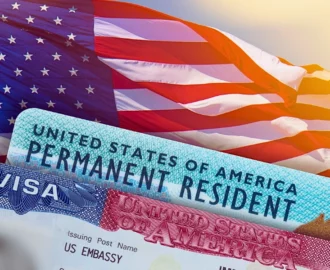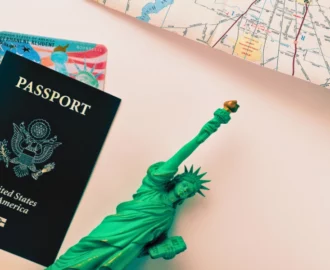If you want to change from an H1-B visa to a tourist visa, you will need to apply for an adjustment of status and go through the necessary process. In some cases, you may want to change from an H1-B work visa to a B2 tourist visa, such as if you lose your job and want to remain in the U.S. Knowing how to change from an H1-B visa to a tourist visa may help ensure a smooth process, and aid you in obtaining the immigration status you seek.

The following guide will provide an overview of both types of visas and the process of changing status from H-1B to B2 visas.
What Is an H1-B Visa?
H1-B visas enable non-immigrants to gain lawful employment in the U.S. in certain types of occupations requiring qualified specialists. Through this type of visa, employers in the U.S. can hire the skilled workers they need for a specific position without relying on U.S. citizens to fill it.
To hire employees on H1-B visas, employers must prove that they pay foreign workers the same wages they would to American employees in the same position and with the same or similar qualifications. This helps protect U.S. citizens seeking employment in the country.
If you want to qualify for an H1-B visa, you need to have a skill set that the prospective position requires along with a bachelor’s degree, a higher degree, or an equivalent level of education.
One of the main benefits for many non-immigrant workers is that the H1-B visa enables them to live in the U.S. temporarily for several years. However, non-immigrants will normally need to return to their home country or previous country of residence if their visa is no longer valid.
The future of H1-B visas is largely uncertain, but the backlog for these visas has presented challenges for many non-immigrant workers as they seek available visas.
What Is a Tourist Visa?
While H1-B visas allow non-immigrants to enter the U.S. temporarily for work purposes, a B-2 visa allows entry for individuals who want to visit the country temporarily for the purpose of vacation and tourism.
The amount of time a person can stay in the U.S. on a B-2 visa is significantly shorter than those on an H1-B visa. Typically, if you’re in the U.S. with a B-2 visa, you will be able to stay in the country for around three to six months.
If you want to qualify for a B-2 visa, you will need to show that you’re in the country specifically for leisure, vacation, or pleasure. This could entail visiting the country simply to spend a vacation abroad, visit family and friends, and tour the country and key locations. You may also be able to obtain a B-2 visa if you’re in the country to receive specialized medical care or take certain courses.
Changing Your Immigration Status from an H1-B Visa to a Tourist Visa
Even if you qualify for an H1-B visa and secure employment, there’s no guarantee that you’ll remain consistently secure in that job. Employers have the ability to let employees go for any valid reason, and that includes H1-B visa employees.
When you lose your job on an H1-B visa, you might be worried about what comes next. You have several options available to you, two of which could involve looking for work elsewhere or voluntarily returning to your home country. However, you will be unable to stay in the U.S. once your visa expires and your time limit to remain within the country runs out.
There are also alternatives to the H1-B Visa for workers. Another option you have, depending on your circumstances, is to request a change of status from an H1-B visa to a B-2 tourist visa.
What to Consider if You Want to Change to a B-2 Visa
Before you begin seeking an adjustment of status to a B-2 visa from an H1-B visa, there are some considerations to keep in mind.
If your H-1B visa expires, this doesn’t necessarily mean that the government will deport you. You may be able to remain in the country for a grace period of 60 days, giving you more time to find work or take other steps to prepare for voluntary departure. You may also remain in the country until your I-94 expires if this period ends before the 60-day grace period.
Keep in mind that if you are in the country on a B-2 visa, you won’t be able to seek work at this time as this visa is specifically for those in the country for tourism and leisure.
In any case, you should avoid waiting for your visa to expire and begin the process of applying for a B-2 visa if this is the right move. Doing so would enable you to remain in the U.S. as a tourist for a limited amount of time.
How to Apply for a B-2 Visa
When applying for a B-2 visa, you will need plenty of evidence that shows that you’re staying in the country on a temporary basis and that you’ll pay for the remainder of your stay in the country. To prove these items, you will need ample documentation as you change from an H1-B visa to a B-2 visa.
Some of the documentation you’ll need includes:
- Your Passport — The passport you have must be valid for a minimum of six months following the date of return to your country of origin or previous country of residence.
- Proof of Funds — You’ll also need to show that you can self-fund your entire stay in the U.S. on a B-2 visa. These will include funds for living expenses, travel, and any other costs to accommodate your stay.
- A Valid Photograph — In addition to your passport’s photo, you will need another one that follows the Department of State’s guidelines.
- Proof of Ties to Your Country of Origin — Another piece of documentation you’ll need is proof of ties to your home country or the country where you previously resided. This could include family, a home or another property, or current or previous occupations.
- Proof of Previous Trips — If you have visited the U.S. at least five times previously, you must have proof of these visits.
Other Steps to Take if You Lose Your Job on an H1-B Visa
If you lose your job at any point when staying in the U.S. on an H1-B visa, you have several options available to you in addition to applying for a B-2 visa.
The following are some specific steps to take if you’re no longer eligible to stay in the country on an H1-B visa.
1. Avoid Panicking
Your first instinct after losing your job may be to panic, but keep in mind you have other options available. You’re allowed to stay within the country legally as long as your H1-B visa isn’t expired, and you take action either before your I-94 expires or the 60-day grace period ends.
2. Look for Work Elsewhere
If you don’t want to apply for a B-2 visa or would like to try an alternative before applying for a change of status, you can take the time to look for a new job. Remember, if you’re in the country on a B-2 visa, you won’t be authorized to look for work in the U.S.
3. Request an Employer Change if You Find a Job
If you manage to find work under another employer, the new employer will need to indicate to the government that you’ve changed employers. However, even if your employer submits an H1-B employer change, it’s possible that you may not qualify and that USCIS may deny the request, which could lead to your departure from the U.S.
Workers who wait too long after a layoff to find a new job are more likely to have their change of employer application denied.
4. Take Other Steps to Maintain Legal Status if You Cannot Find Work
When planning to stay in the U.S. after a layoff, you should take immediate action to maintain legal status in the country. If you opt not to apply for a B-2 visa, you may apply for a B-1 visa if an employer revoked your H1-B visa. If you cannot find work and your H1-B visa is still valid, you should also consider applying for a B-1 visa.
Go Through the Proper Process to Change Your Non-immigrant Status
When staying in the country on an H1-B visa, it’s important to understand that there are other options available to you if you no longer qualify for this particular visa. One of these options is to apply for a B-2 visa if it applies to your situation.

If you’re not sure which option is right for you or how to change from an H1-B visa to a tourist visa or otherwise maintain legal status, an H1-B visa attorney may be able to help.
By working with the right immigration attorney and understanding what to expect when changing status, you may be able to successfully change from an H1-B visa to a B-2 tourist visa.




